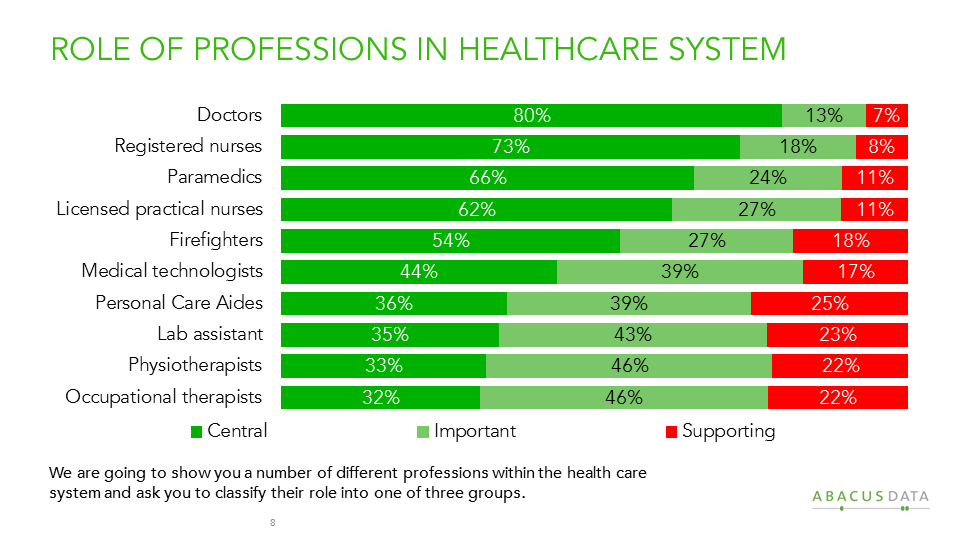WHAT IS THE ROLE OF PARAMEDICS IN CANADA’S HEALTHCARE SYSTEM?
September 28, 2016
 Background
Background
On behalf of the Paramedic Association of Canada, Abacus conducted an extensive online nationwide study of Canadians’ views of healthcare and the role of paramedics. The sample size was 2,181 adult Canadians and the survey was conducted from September 9 to 12, 2016.
What issues in the healthcare system most concern Canadians?
Emergency room wait times and capacity, surgery wait times, and hospital overcrowding are issues in which a majority or close to a majority of Canadians consider a serious problem in the healthcare system. Access to a family doctor is also considered a serious problem by four in ten Canadians.
Comparatively, home care, geriatric health care services, prevention of illness and the emergency response time of paramedics are less likely to be considered serious problems in the system.

There was little regional variation in perceptions about the problems except for:
• Quebecers were more likely to consider emergency room wait times (71%), hospital overcrowding (65%), and access to a family doctor (68%) a serious problem.
• British Columbians were more likely to be concerned about hospital overcrowding (51% serious problem) and access to a family doctor (47% serious problem).
• Atlantic Canadians were more likely to believe that surgery wait times (61%) and emergency room wait times and capacity (62%) were serious problems.
The survey also found that older Canadians are more likely to think the health care issues identified were serious problems in Canada. In particular, 66% of those aged 60 and over believed that surgery wait times were a major problem, 25 points higher than those aged 18 to 29.
2 in 3 Canadians believe that paramedics play a central role in the healthcare system.
Respondents were asked to classify whether a number of professions played a central role, an important role, or a supporting role in the healthcare system.
Overall, 80% of Canadians believed that doctors play a central role followed by registered nurses (73%) and paramedics (66%). In total 90% of Canadians believed that paramedics play either a central role in Canada’s healthcare system or an important role.
The views about paramedics are consistent across the country although older Canadians and those who have been treated by a paramedic were more likely to consider paramedics central to the healthcare system.

Paramedics are as trusted as doctors or nurses to make on-the-spot medical decisions.
When asked to what extent they trust doctors, nurses, and paramedics to make on-the-spot medical decisions about their personal health, six in ten (61%) Canadians said they had high trust in paramedics compared with 64% for nurses and 70% for doctors.
Once again, these views were strongly related to one’s age. Older Canadians were more likely to trust paramedics to make on-the-spot medical decisions than younger Canadians. There was no variation across region or gender.

80% of Canadians support the idea of Community Paramedicine.
Respondents were shown the following description of community paramedicine and asked whether they support or oppose the idea of community paramedicine:
Traditionally, paramedics are trained to respond to emergency 911 calls, treat patients who are ill and/or injured, and transport patients to emergency departments. However, not all patients require transportation to an emergency department. Many simply need a basic health assessment, minor treatment, and referral to an appropriate community, or other health care service.
Community Paramedicine is about engaging paramedics in non-traditional roles to assist in delivering health care to urgent and non-urgent, but not life threatening situations. By expanding the role of paramedics, and working collaboratively with other health care professionals and community agencies, paramedics can manage patients who do not require immediate treatment and transportation to an emergency department.
Under a Community Paramedicine model, paramedics will continue to respond to medical emergencies and provide non-urgent medical care within the community and at patients’ homes.
Overall, 80% of Canadians we surveyed either strongly support (39%) or somewhat support (41%) the idea of community paramedicine as presented in the survey. Only 3% are opposed to it and the remaining 16% said they neither support nor oppose it.
Support for the idea is consistent across the country and is particularly popular among women – 46% of whom strongly support the idea of community paramedicine.

9 in 10 Canadians think paramedics should be invited to participate in negotiations over a new national Health Accord.
Finally, respondents were asked whether a number of health professionals should be invited to participate in negotiations around a new health accord between the federal and provincial governments. Overall, a large majority of Canadians believe that doctors (92%), nurses (91%), and paramedics (90%) should be around the table.

The Upshot
Health care remains a top concern for many Canadians, especially at it relates to capacity and access issues in emergency rooms, hospitals, and access to a family doctor. Given these concerns, Canadians recognize and value the role that paramedics can play in improving access and outcomes for Canadian patients.
Paramedics in Canada are well regarded, trusted, and seen as central to the health care system. There is almost no resistance to the concept of community paramedicine and large numbers of Canadians enthusiastic support it, especially women who value the peace of mind knowing that their loved ones will be cared for if a medical emergency or situation arises.
Given the reputation of the process and the role Canadians see paramedics playing, it should be no surprise that the public thinks they should be part of the national discussion about the future of healthcare and be invited to be part of the negotiations around a new national health accord.
Methodology
The survey, commissioned by the Paramedic Association of Canada, was conducted online with 2,181 Canadians aged 18 and over from September 9 to 12, 2016. A random sample of panelists was invited to complete the survey from a large representative panel of over 500,000 Canadians, recruited and managed by Research Now, one of the world’s leading provider of online research samples.
The Marketing Research and Intelligence Association policy limits statements about margins of sampling error for most online surveys. The margin of error for a comparable probability-based random sample of the same size is +/- 2.1%, 19 times out of 20. The data were weighted according to census data to ensure that the sample matched Canada’s population according to age, gender, educational attainment, and region. Totals may not add up to 100 due to rounding.
Paramedic Association of Canada
The Paramedic Association of Canada is a voluntary professional organization of paramedicine practitioners in Canada. Its missions is to provide quality care for the public through leadership in the advancement of the profession of paramedicine. For more information, contact Pierre Poirier at pierre.poirier@paramedic.ca, or visit their website at http://www.paramedic.ca/
Abacus Data Inc.
We offer global research capacity with a strong focus on customer service, attention to detail and value-added insight. Our team combines the experience of our Chairman Bruce Anderson, one of Canada’s leading research executives for two decades, with the energy, creativity and research expertise of CEO David Coletto, Ph.D. For more information, visit our website at http://www.abacusdata.ca/



